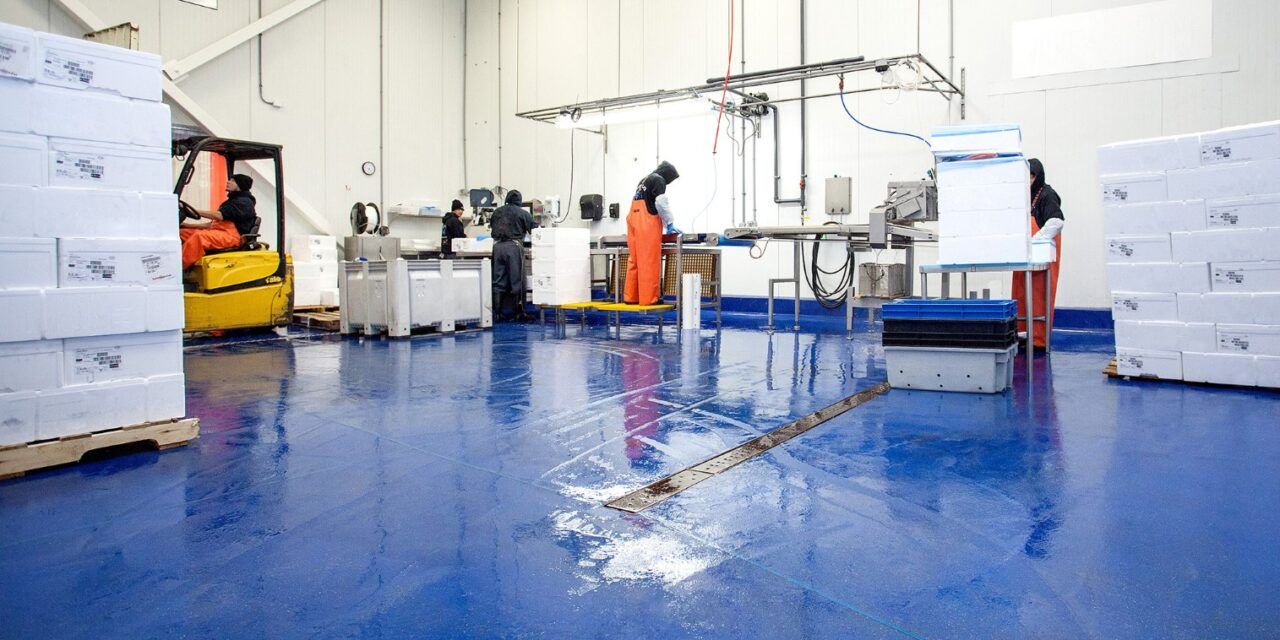Warsaw, 13 October 2022 – The thermal resistance of resin floors is a complex issue. One should always look at it in a broader context, together with the anticipated mechanical and chemical loads. In the food industry, the conditions include the raw materials stored in cold rooms and freezers, processing at high temperatures, intensive cleaning of floors with warm water or steam. In these conditions, the resistance of flooring systems to low and high temperatures and the so-called thermal shock is a crucial issue.
Experts from the Flowcrete brand, a leading manufacturer and supplier of resin flooring, including solutions for food processing facilities, present the five most important facts about the thermal resistance of these materials and technologies.
- High temperature increases the strength of mechanical and chemical loads.
Mechanical and chemical loads, combined with high temperature, are much more dangerous for the floor. Such a situation occurs when a floor is not resistant to such conditions and thus may become soft and plastic, its strength decreases, and under the influence of the same loads, greater damage occurs. In addition, many chemicals are much more aggressive at high temperatures, which means that the degradation of the floor occurs faster.
- The so-called thermal shock is the most dangerous for floors.
A thermal shock means a dynamic temperature change. It occurs when washing the cold floor in a cold room with warm water or, for example, when a heated bakery trolley from the oven moves to other areas of the facility. Thermal shock is dangerous, in particular, due to the tensions occurring at the joint between the resin floor and the concrete substrate, which may lead to delamination or detachment of the flooring from the substrate. Floor systems with increased resistance to thermal shock are characterized by increased flexibility, enabling the transfer of internal forces.
- The thickness of the floor affects the range of its thermal resistance.
Floors intended for use in food processing plants, i.e. antibacterial flooring systems from the Flowfresh group, based on polyurethane resins and specially selected aggregates and cement, are resistant to low and high temperatures. For example, in the case of a 6 mm thick floor (e.g. Flowfresh HF, Flowfresh RT or the Flowfresh SR anti-slip variant, designed for wet production), the thermal resistance covers the temperature range from -25oC to +90oC. The same floors, but 9 mm thick, have thermal resistance in the temperature range from about -40oC to +120oC.
- A distinction should be made between resistance to high temperature during permanent and periodic exposure.
In the case of thermal loads, one should distinguish between permanent and periodic exposure. Permanent exposure means continuous contact with media of high temperature, while periodic exposure occurs in a situation of short-term contact, e.g. as a result of an occasional spill of a hot substance on the floor. As a rule, when manufacturers provide a single temperature value in Celsius degrees in the tables with technical data, this means the upper temperature limit to which the floor is resistant to long-term exposure. The periodic resistance is usually higher – even by 20oC.
- Chemically resistant floors are usually also the most thermally resistant.
The flooring systems with no shrinkage, applied with a spatula, which are based on vinyl ester resin with the addition of quartz sand, are resistant to constant temperature up to +185oC with a thickness of 10–15 mm. Due to their very high chemical and mechanical resistance, they are used mainly in heavy industry.
One of the first steps when choosing a floor for a specific investment project is to define its terms of use. When the temperature in the room is low or high, or there is a risk of the so-called thermal shock, anticipated chemical and mechanical loads should be taken into account. It is worth asking for support from technical advisors – experts in resin floors, who, based on their knowledge and experience, will suggest what issues to pay attention to and propose an appropriate solution.




























